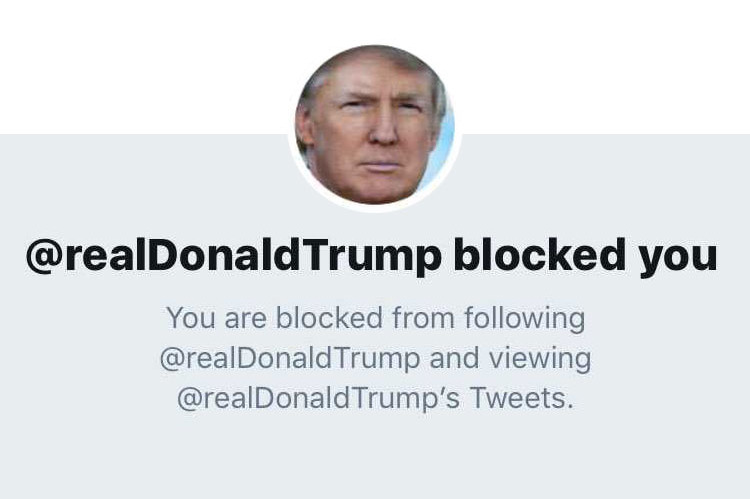@realDonaldTrump blocked you: Commander-in-Chief’s quirk more than just obnoxious, it’s unlawful
March 9, 2018
If there’s one thing President Donald Trump is good at, it’s pushing people’s buttons—but lately it seems that the block user feature on Twitter is Trump’s favorite button to push.
Trump’s Twitter presence has become more pronounced during his presidency and many desperate Americans are turning to Twitter to reach out to their president.
There’s no denying that Trump still has a lot to learn when it comes to disagreement and to his dismay, not all who turn to Twitter in attempt to grab Trump’s attention are fans of his or agree with what he has to say.
Trump, who has had a Twitter account since March 2009, has been actively tweeting during his presidency and seems to have no reservations when it comes to what he posts—a fine quality for a president. #covfefe
But when it comes to mentions and retweets with opinions that don’t mimic his own, Trump is quick to dismiss these Twitter users by blocking them from viewing all the content on his Twitter account—essentially blocking people from having access their president.
Twitter’s block feature is available to all of its users and Twitter account holders are allowed to monitor and use it to their discretion. When the block feature is used, it denies the person being blocked access to follow and view tweets of that account.
Though a harmlessly passive way to break a social connection with another Twitter user, this should not be the case for our commander in chief.
Trump probably considers this hater-blocker feature one of the greatest ideas of all-time, but unfortunately for him, blocking people from viewing his content isn’t exactly the most lawful move.
The Presidential Records Act of 1978, created after the Nixon scandal, has strict defining rules on what can be classified as presidential record, and it includes records created on electronic platforms such as Twitter.
This means that everyone should be able to view Trump’s tweets on his Twitter account, and preventing that would actually be unlawful.
Under this act, presidential records can be accessed by the public online in the National Archives. Trump’s electronic platforms that fit under what could be classified as presidential record, such as his Twitter, should not be immune from this law.
This is not to suggest that as a Twitter user he should be denied this feature indefinitely.
But considering this law, this feature should be temporarily suspended for those who hold high positions of political office and chose to have public social media accounts during their time in office.
If the Presidential Records Act suggests that electronic platforms are presidential record that can be accessed by the public, then it should be like that on all platforms.
Not just the National Archives, but the Twitter accounts of high profile politicians as well.
Politicians shouldn’t have the power to restrict select people from viewing something that the majority of people are able to access as their right.
The act of blocking is unconstitutional as it consequently grants certain people greater access to their president in comparison to their blocked peers.
But the biggest oversight when it comes to hater-blocking on Twitter is that when a president blocks a user, he passively creates inequality within Twitter users—a not so fine quality for a president.

